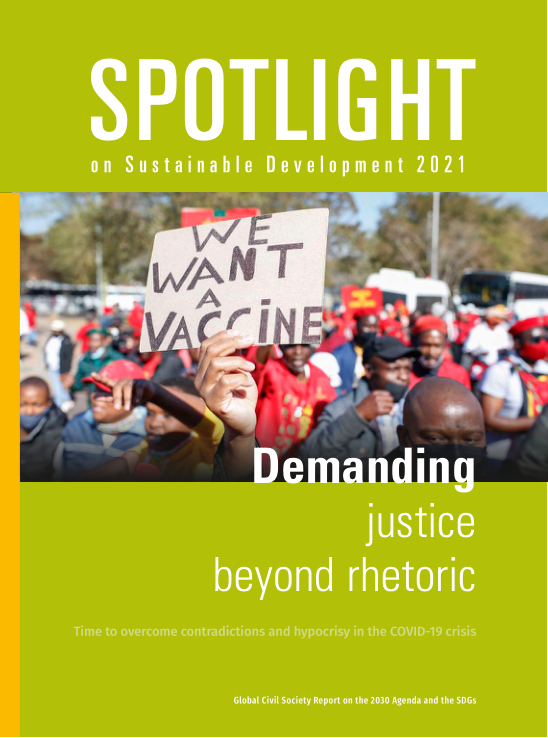The dominant interests of rich countries and corporate powers continue to dominate political decision-making. Given the urgency of the COVID-19 crisis and the other unresolved global problems, most notably the climate emergency, it is high time for transformative policies at all levels, and for a shift towards a rights-based economy.
This is the key message of the Spotlight on Sustainable Development Report 2021, the most comprehensive global civil society assessment of progress on the sustainable development agenda and the systemic obstacles it faces.
According to the report, economic justice based on human rights can be achieved, but the trend towards privatizing, outsourcing, and systematic dismantling of public services must be reversed. The report diagnoses a number of the starkest imbalances and injustices in current responses to the pandemic, building from national-level analyses and case studies of developments in several countries, including Argentina, South Africa, and Colombia (in a contribution authored by CESR’s Sergio Chaparro), but it also proposes transformative alternatives, outlining the need for a Rights-Based Economy in a chapter authored by CESR’s Kate Donald.
To combat growing inequality and build a socially just, inclusive post-COVID world, everyone must have equitable access to public services, first and foremost to healthcare and education. To prevent the COVID-19 pandemic being followed by a global debt and austerity pandemic, governments must be enabled to expand their fiscal policy space and properly tax multinational corporations and wealthy individuals, many of whom pay virtually no income tax at all. Fundamental reforms in the global financial architecture, including a debt workout mechanism—beyond piecemeal relief measures for debt servicing— are long overdue.
The report is launched at a moment when the crisis has prompted some world leaders to recognize the need to discard the status quo. Echoing some of the demands of the report, the UN Secretary General has recently called for “re-embracing global solidarity” and the need for a renewed social contract “anchored in human rights”. The UN High Commissioner is calling for “a just transition to a sustainable, human rights-based economy”. But real solidarity remains thin on the ground, and those who hold the most power in the global economy still seem unwilling to move beyond rhetoric to action. A response and a recovery based on human rights is the surest way to ensure there is no going back to the profoundly unjust “normal” which enabled and exacerbated this crisis.
